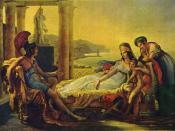The Aeneid by Publius Vergilius Maro (Virgil) is one of the most important pieces of classical literature because it had such an immeasurable impact on the Roman world. The Aeneid gives modern scholars an important tool in understanding both Roman mythology and the times during which the Aeneid was written, during the reign of Rome's first emperor Augustus. Under Augustus, Roman memories of the bitter civil wars that had plagued Rome for a century and the resulting chaos gave all Romans a sense of insecurity. The epic poem, the Aeneid, was commissioned by Augustus with the hope of uniting all Romans and giving them a sense of shared history worthy of pride and containing lessons to emulate. Virgil's works are often compared to those of the Greek poet Homer. The Aeneid was written in a way that lacked the originality of the Homeric epics however the two authors use similar themes and character which share common traits.
Virgil intended to surpass the Homeric epics in quality while at the same time relying on them heavily, an element that draws criticism from many modern scholars.
The Aeneid tells the story of the Trojan hero Aeneas's dangerous flight from Troy to Italy following the Trojan War. It was prophesied by Apollo that in Italy, Aeneas's descendents would go on to found the great city of Rome. As Aeneas and his companions sail towards Rome a storm sends them off course and they land in Carthage. Carthage's founder and queen, Dido, welcomes them and encourages Aeneas to tell her the tale of how the city of Troy fell and the events of their journey that led them to Carthage. Aeneas complies and tells a detailed story of the events of the war. Some elements of his story mirror those found in the Homeric...


